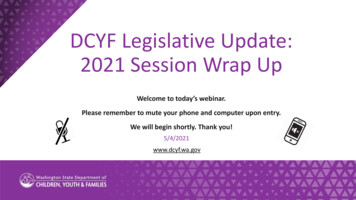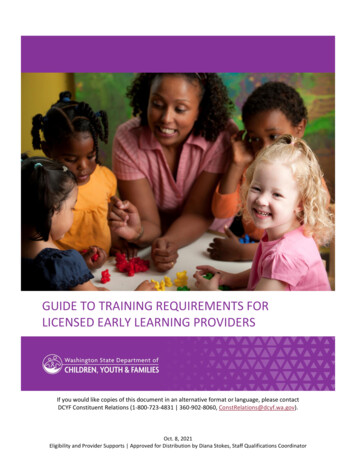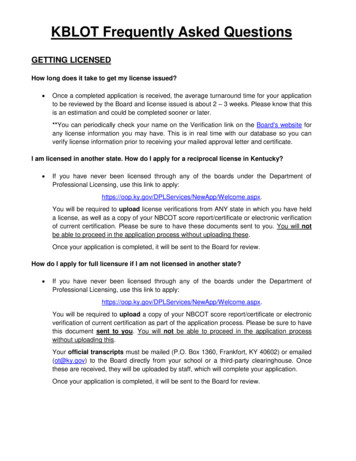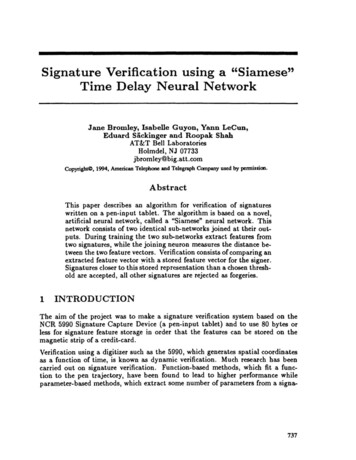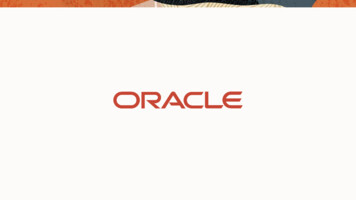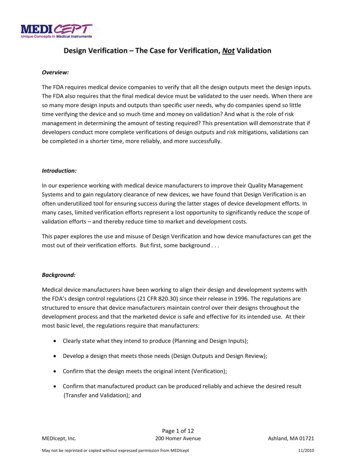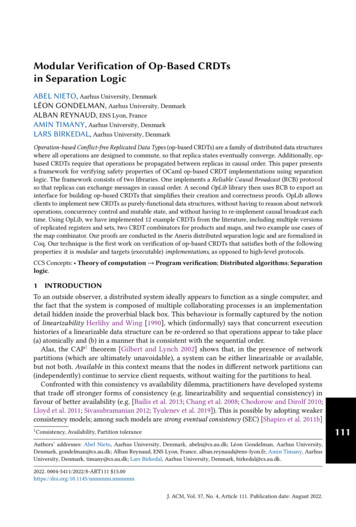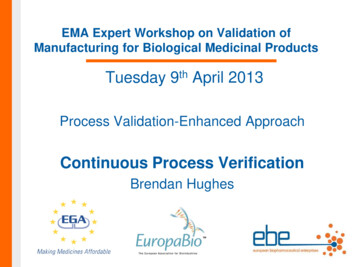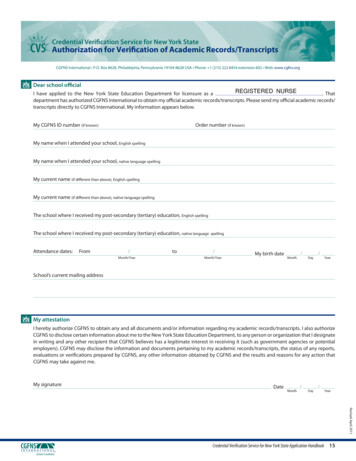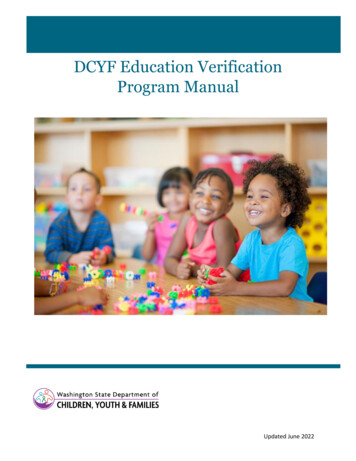
Transcription
DCYF EDUCATION VERIFICATION PROGRAM MANUALDCYF Education VerificationProgram ManualUpdated June 2022
DCYF EDUCATION VERIFICATION PROGRAM MANUALContentsSection 1: Purpose and Overview . 1Education Verification. 1Section 2: Roles and Responsibilities . 1DCYF Professional Development. 1System-building Partnerships . 1Program Review for Staff Qualifications . 1DCYF Support Services . 2Centralia College . 2Management . 2Monitoring Implementation for Quality Assurance. 2Reporting. 2Education Verifier Reliability. 2Areas of Knowledge . 3Section 3: Recognizing Credentials . 3DCYF Recognized Accreditation . 4Supporting Document Requirements . 4DCYF Recognized Coursework . 5Education Appeals . 5Education Appeal Process . 5Education Awards . 6Education Award . 6Movement Award . 6Program Review for Staff Qualifications . 6Section 4: Verifying Education for Staff Qualifications . 6Equivalent Options for Education . 6Verifying Degrees . 7Verifying International Degrees . 7Verifying ECE Degrees . 8Verifying ECE Related Degrees . 8Verifying Non-ECE degree . 9Verifying Aligned College Credits . 9Aligned to Initial Certificate . 9Aligned to Short Certificate. 9Aligned to State Certificate . 9Verifying DCYF-Recognized Certificates and Credentials. 10Professional Development Plans (PDP). 11Section 5: Verifying Education for Training Requirements . 12Verifying College Coursework for In-Service Training Hours . 12Verifying college coursework for annual in-service hours process: . 12Verifying Child Care Basics Alternatives. 12Appendix A: . 13Appendix B: . 14Appendix C . 15Updated June 2022
DCYF EDUCATION VERIFICATION PROGRAM MANUALAppendix D . 16Updated June 2022
DCYF EDUCATION VERIFICATION PROGRAM MANUALThis manual defines how the DCYF EducationVerification Program is administered to theearly learning workforce.Updated June 2022
DCYF EDUCATION VERIFICATION PROGRAM MANUALSection 1: Purpose and OverviewThe purpose of this manual is to summarize the education verification process for contractors or otherswho are curious about the basic principles of implementing the education verification process for theDepartment of Children, Youth, and Families (DCYF). For additional information about policies andprocedures, please visit the Professional Development Policy and Procedure Manual.Education VerificationThe Professional Development system in Washington state is supported through a valid and reliableeducation verification process based on the education standards for the early learning field (WashingtonState Core Competencies for Early Care and Education Professionals and Child and Youth DevelopmentProfessionals).It allows the professional to determine compliance with their role requirements, provides an opportunityto build a professional record, and makes it easier to see how they can move into other related roles.DCYF uses the data to support the growth of a diverse workforce, inform program compliance, andrecognize professional accomplishments. This data also allows policymakers to make decisions aboutprogram-wide improvements that address barriers of entry into the field.All verified education is recorded in the online professional development Workforce Registry, MERIT.Verified education is only valid for the purposes of the Workforce Registry. It is not valid for use for anyother employment or education purposes.Section 2: Roles and ResponsibilitiesDCYF Professional DevelopmentThe DCYF Professional Development team oversees the implementation of the education verificationprocess, policy development, and design of the MERIT Workforce Registry.System-building PartnershipsThe DCYF Professional Development team partners with colleges and universities across Washingtonstate to stay current on degree offerings and share workforce data for higher education planning andprogram development. This partnership is crucial for understanding existing workforce recruitment andretention efforts and planning for future workforce needs.Program Review for Staff QualificationsDCYF supports the recognition of new programs, certificates and credentials through an applicationprocess. When a program is recognized by DCYF, the degree, certificate or credential that is offered isrecognized for meeting role requirements. In addition, DCYF will review any new program application todetermine if it is eligible to be a part of the DCYF scholarship program.1
DCYF EDUCATION VERIFICATION PROGRAM MANUALDCYF Support ServicesThe DCYF Professional Development team provides policy and technical support for internal DCYF staffand external MERIT Workforce Registry users regarding the education verification process and policy. Thisteam is responsible for: Monitoring and managing communications.Providing individualized consultation services focused on career pathways and options formeeting staff qualificationsEnsuring accurate record retention and workforce data for education.Developing communication about policies, processes, and requirements for educationverification.Processing and recording education earned internationally or by Early Achievers Grant recipients.Centralia CollegeCentralia College is responsible for implementing the education verification process in partnership withDCYF.ManagementCentralia College manages the implementation of the education verification program.Monitoring Implementation for Quality AssuranceCentralia College is responsible for continuously monitoring the implementation of the educationverification process. To ensure accuracy and reliability, a quality check process is used to revieweducation once it has been entered into the MERIT Workforce Registry. DCYF is then responsible forrandomly spot checking verified education for accuracy once corresponding supporting documents havebeen submitted to DCYF for permanent storage.ReportingCentralia College provides DCYF monthly data reports and quarterly, reflective narratives about theeducation verification program performance. This summarized information is monitored by DCYF forcontinuous program reflection and improvement.Education Verifier ReliabilityCentralia College is responsible for ensuring all education verification staff have the necessary skills,knowledge and familiarity with DCYF policies and education verification processes. This includes ongoingtraining to ensure all staff use consistent and reliable methods.2
DCYF EDUCATION VERIFICATION PROGRAM MANUALAreas of KnowledgeDCYF Policy and WACRequirements DCYF ProfessionalDevelopment policy Intersection of agencyprograms (ECEAP, EarlyAchievers, Licensing) WAC role requirements foreducation and training Related and equivalentoptions (for staffqualifications and trainingrequirements)WA State Core Competencies WA State Core Competenciesfor Early Care and EducationProfessionals WA State Core Competenciesfor Child and YouthDevelopment Professionals Core Competenciesconnection to coursecontent– including EarlyChildhood Education, SchoolAge professionals, andothers.MERIT Workforce Registry System navigation Point of contact fortroubleshootingCollege & University Systems Ability to independentlyevaluate a transcript withsupport materials Transcripts and college oruniversity support resource Course catalogs, syllabi,program requirements, etc. Roles and responsibilitieswithin college and universitysystems When to contact registrar,deans, academic advisor, etc.Section 3: Recognizing CredentialsDCYF administers a credentialing program that includes multiple partners and collaborators to provide anaccessible process for the early learning workforce to have their accomplishments reflected in the MERITWorkforce Registry.This program includes multiple pathways for recording education:1. Education Earned in the United States This includes diplomas, degrees, certificates and credentials, and DCYF-approvedalternative credentialsAdministered by contracted partner, Centralia College.2. Education earned Internationally 3.This includes diplomas, degrees, certificates and credentialsAdministered by DCYFRecording Completion of Education through State Partnership This includes recording certificate completions for WA State Scholarship RecipientsCoordinated through a data share agreement with the State Board for CommunityTechnical College (SBCTC) and DCYF.For additional information about education verification workflow for Centralia College see appendix b.3
DCYF EDUCATION VERIFICATION PROGRAM MANUALDCYF Recognized AccreditationDCYF recognizes and records educational programs in the MERIT Workforce Registry that meet one of thefollowing accreditation criteria:Education earned in the United States Higher education institutions regionallyaccredited and recognized by the USDepartment of EducationCertificate or credential programsaccredited through valid accreditingbodies and recognized by DCYF(Example: MACTE, AMI, AMS and PMNAaccreditation for Montessori).High School institutions or GraduateEquivalency Diploma (GED) programsregionally accredited and recognized bythe US Department of Education.Education earned Internationally Option 1: AACROA confirmation ofcompletion, which meets the US industrystandards for international educationreview.Option 2: NACES course-by-courseevaluation.Supporting Document RequirementsAll education must be verified through supporting documents. Additional documentation may berequested to complete the verification. Non-English documents may require an English translation.What is being verified?High School Diploma or GEDInternational EducationCopy of High School diploma orGEDSameCopy of official transcriptSameCompleted DegreeCopy of official transcript withdegree completion datemay require an Englishtranslation.Official supportingdocuments and a copy ofdiplomamay require an Englishtranslation.Certificate or CredentialCopy of certificate/credentialOR copy of official transcript withcertificate/credential completiondateCopy of unofficial transcriptCollege CourseworkCollege Coursework for Inservice training hours only4Required Supporting Documentationmay require an Englishtranslation.Samemay require an Englishtranslation.Not available
DCYF EDUCATION VERIFICATION PROGRAM MANUALDCYF Recognized CourseworkAll college credits 100 level or above are recorded in the MERIT Workforce Registry.Verified credits are recorded as Early Childhood Education (ECE), School Age, and Early Childhood/SchoolAge (ECE/School-Age) credit. Education verifiers use Verification Worksheet (appendix A) to note howcredits relate to specific Washington State Core Competencies for Early Care and Education Professionalsand Child and Youth Development Professionals). Credits not related to the to the WA State CoreCompetencies are recorded as non-applicable (N/A) and are not visible from a professional record.ECE Course content in the fieldof early childhoodeducation anddevelopment (birth-age 8). Terms such as "youngchild" and "infants andtoddlers" indicate ECEdesignation. Depending oncourse content othercodes may include CFS,CHDV, EDUC, etc.School-Age Course content in theeducational field (age 921). Terms such as"adolescent" and "middlechildhood" and "middleschool" indicate youthcontent. Depending oncourse content, othercodes may include EDU,SOWK, PSYC, etc.ECE/School-Age Course content thatoverlaps the field ofeducation and childdevelopment that spans(birth-age 8) andelementary education. Terms such as"elementary" and "youth"indicate ECE/School-Agedesignation. Depending oncourse content, othercodes may include EDU,SOWK, PSYC, etc.For examples of coursework related to the WA State Core Competencies for Early Care and Educationplease see: Evaluating Coursework for Staff QualificationsEducation AppealsVerified education may be appealed within 60 days of completed verification (see ProfessionalDevelopment Policy 203). Appeals must be resolved within 10 business days of receiving all necessarysupporting documents.The appeal form can be found at: https://www.dcyf.wa.gov/forms?field number value 05-005&titleEducation Appeal Process1. The education verifier is the first point of contact for appeals. They are responsible for: Reviewing the Education Appeal form and corresponding supporting documents todetermine if an error occurred during the verification process. Recording the recommended appeal outcome in the individual MERIT record. Notifying DCYF of the recommended appeal outcome. Submitting recommended data corrections to DCYF, as needed. Tracking the appeal outcome in a monthly data report for DCYF.2. DCYF is responsible for:5
DCYF EDUCATION VERIFICATION PROGRAM MANUAL Reviewing the recommended appeal outcome submitted by the education verifier.Determining final appeal outcome.Updating the MERIT record, if a correction is needed.Notifying the individual of the appeal outcome.See Education Verification Workflow (appendix b).Education AwardsEducation AwardWhen determining if an individual qualifies for an education award please see policy 205 in the PD PolicyManualMovement AwardWhen determining if an individual qualifies for a movement award, please see policy 206 in the PD Policymanual.Program Review for Staff QualificationsDCYF uses an application process to recognize new programs as meeting staff qualificationsrequirements. Program recognition may also inform DCYF scholarship policy. Only programs that meetthe following are eligible to apply: Course content must have hours and content that are equivalent to the WA State ECE Stackablecertificates. Course content aligns with the WA State Core Competencies for Early Care and EducationProfessionals. Meet DCYF accreditation requirements.To apply for recognition, the institution related to the program must complete the DCYF Recognition forNew Programs application. To request an application please contact MERIT@dcyf.wa.gov.DCYF strives to complete program evaluations within 30 days of the date all materials were received.Section 4: Verifying Education for Staff QualificationsAll education must be verified to determine if an individual meets the staff qualification requirements fortheir role.Equivalent Options for EducationEarly learning and School-age professionals have multiple options, known as “equivalents,” for meetingeducation staff qualifications. For licensed early learning and school-age professionals, equivalent optionsmay include education, training, or experience. The education equivalent option is referred to asalternative credentials and includes:6
DCYF EDUCATION VERIFICATION PROGRAM MANUAL Degrees in Early Childhood EducationDegrees Related to Early Childhood Education (ECE)Aligned College CreditsDCYF-recognized Certificates and CredentialsNon ECE degree plus DCYF micro-credential *coming Spring 2023For more information about “equivalents” please see the Equivalent Options for Education guide andAlternative Credentials guide.Verifying DegreesDCYF recognizes degrees earned from a higher education institution that hold regional accreditation andare recognized by the US Department of Education.To meet education staff qualifications, all degrees must be verified and recorded in the MERIT WorkforceRegistry. Verifying a completed degree requires copies of official transcripts that include information aboutcorresponding coursework and the date of completion.Verifying International DegreesAll education earned internationally is verified in MERIT by a DCYF Credentialing Specialist. DCYF offerstwo pathways for verifying internationally earned education:1.Recognizing education earned from an international higher education institution as a USequivalent using the American Association of Collegiate Registrars and Admissions OfficersElectronic Database for Global Education (AACRAO EDGE). 2.This option requires an individual to complete an Education Application in MERIT andsubmit supporting documents to Education.verification@centralia.eduSupporting documents may include official transcripts or a diploma that includes date ofcompletion. Translated documents may be requested by DCYFNon-English supporting documents may require an English translation.Recognizing degree equivalency through a NACES course-by-course evaluation. The degree and official transcript must be submitted to any of the NACES memberorganizations. If the degree and coursework is in a language other than English, it mustbe translated into English. Price, process for translation and turnaround time vary byorganization.This options requires an individual to complete Education Application in MERIT andsubmit copies of translated official documents from NACES for review in one emailsubmission to Education.verification@centralia.eduSee Appendix C: Process for verifying International Education7
DCYF EDUCATION VERIFICATION PROGRAM MANUALVerifying ECE DegreesDCYF recognizes the following degrees as ECE degrees: Human Development with a specialization in ECEEarly Childhood EducationChildren’s Studies with emphasis in Childhood EducationElementary Education with an endorsement ino Early Childhood Educationo Early Childhood Special Educationo P-3o P-3 Special EducationVerifying ECE Related DegreesDCYF recognizes a degree as being an ECE related degree if it meets the following: It is a bachelor or advanced degree from a regionally accredited institution recognized by the U.S.Department of Education; It meets one of the following options:1. It is a DCYF-recognized related degrees major: Elementary Education major that includes: One course covering ECE curriculum. One class covering guidance/behavior or a practicum class in ECE. Human Development, Child Development, Child and Family Studies, andChildren’s Studies major that includes: One course covering ECE curriculum. One class covering guidance/behavior or a practicum class in ECE.2. It includes a minimum of 30 college credits in ECE or related coursework. These 30 creditsmust include at least two credits in each of the following Early Care and EducationCompetency areas: Child Growth and Development Curriculum and Learning Environment Ongoing Measure of Child Progress (Observation, Assessment, andDocumentation) Families and Community Partnerships Health, Safety, and Nutrition Interactions Program Planning and Development Professional Development and Leadership (Professionalism)3. In addition to a completed degree earned from an accredited institution of highereducation, the applicant has also completed one of the following: Montessori Accreditation Council for Teacher Education (MACTE) accreditedteacher credential in infant/toddler MACTE accredited teacher credential in ECE Association Montessori Internationale (AMI) diploma in assistants to infancy(birth-3) Association Montessori Internationale (AMI) diploma in primary (ages 3-6)8
DCYF EDUCATION VERIFICATION PROGRAM MANUAL American Montessori Society (AMS) diploma in assistants to infancy (birth-3)American Montessori Society (AMS) diploma in primary (ages 3-6)For an example list of courses that may meet each Core Competency area, please see the Evaluating EarlyChildhood Coursework guide.Verifying Non-ECE degreeDCYF records all non-ECE degrees in the MERIT Workforce Registry. Coursework that is not related to theWashington State Core Competencies for Early Care and Education Professionals and Child and YouthDevelopment Professionals are recorded as N/A.Verifying Aligned College CreditsAligned credits can be a collection of college credits that provide similar knowledge and skill as one of theWA State ECE Stackable Certificates. To determine if completed credits are aligned to a WA State ECEStackable certificate, they must be verified and recorded in the MERIT Workforce Registry. For ECEAP educators, the aligned credits option is only available for the role of ECEAP assistantteachers. Currently DCYF does not offer an aligned credit option for those in an ECEAP leadteacher role.Aligned college credits are not an available option for international educationAs the process of aligning credits directly to the stackable certificate coursework is not yet available inMERIT, alignment is currently based on total number of ECE and ECE/School-Age credits earned.For an example list of courses that may meet each Core Competency area, please see the Evaluating EarlyChildhood Coursework guide. NOTE: English and Math are not required.Aligned to Initial Certificate12 college quarter credits that meet the following: 5 credits in Curriculum and Learning, Family/Community, or Interactions 3 credits in Health, Safety, and Nutrition 4 credits in any ECE Competency areaAligned to Short Certificate20 college quarter credits that meet the following: 5 credits in Curriculum and Learning, Family/Community, or Interactions 3 credits in Health, Safety, and Nutrition 5 credits in Child Development 7 credits in any ECE Competency areaAligned to State Certificate45 college quarter credits that meet the following: 10 credits in Child Development, Curriculum and Learning, or Interactions 5 credits in Health, Safety, and Nutrition 5 credits in Ongoing Measure of Child Progress 5 credits Program Planning and Development or Professional Development and Leadership9
DCYF EDUCATION VERIFICATION PROGRAM MANUAL 2 credits Family and Community Partnerships18 credits in any ECE Competency areaVerifying DCYF-Recognized Certificates and CredentialsDCYF recognizes various certificates and credentials for meeting licensing staff qualifications. Includedbelow is a list of certificates and credentials that DCYF recognizes and records in the MERIT WorkforceRegistry. Information on what certificates and credentials meet the education requirements is available inthe Equivalent Options for Education guide.Stackable CertificatesWashington State ECE initial certificateWashington State ECE short certificate of specialization - GeneralWashington State ECE short certificate of specialization – AdministrationWashington State ECE short certificate of specialization – Family Child CareWashington State ECE short certificate of specialization – Home VisitingWashington State ECE short certificate of specialization – Infant and ToddlerWashington State ECE Short certificate of Specialization - School Age CareWashington State ECE State certificateTeaching Certificates & EndorsementsWashington State Teaching Certificate endorsements:a. Early Childhood Educationb. Early Childhood Special Educationc. P-3d. P-3 Special EducationUniversity of Washington P-3 Executive Leadership*Other Certificates1-year ECE certificate/diploma (minimum 45 credits)13 Military ModulesMACTE accredited teacher credential in ECEMACTE accredited teacher credential in Infant/Toddler (I/T)Montessori Elementary 1Association Montessori Internationale (AMI) diploma in assistants to infancy (A to I) – covers birth-3Association Montessori Internationale (AMI) diploma in primary – covers 3 to 6American Montessori Society (AMS) diploma in assistants to infancy (birth-3)American Montessori Society (AMS) diploma in primary (ages 3-6)Child Development Associate (CDA) credentialOther Family Support/Social Service Credential*o A Family Support Core Certificate from Edmonds Community College.o A Family Support Studies Certificate from Edmonds Community College.o A National Family Service Credential from the University of Connecticut.o A Human Services Case Management and Administration Certificate from Washington StateUniversity with a case management focus.o Social Service Competency-based training program (SSCBT) from Tennessee State University10
DCYF EDUCATION VERIFICATION PROGRAM MANUALoA credential from a comprehensive and competency-based Family/Social Service program notmentioned above that increases knowledge and skills in providing direct services to families(subject to DCYF approval).Other Certificate equal to minimum of 12 ECE creditsFamily Support Studies certificate from Edmonds Community CollegeHome Visitor Child Development Associate (CDA) credentialFamily Development Certificate from Community Action PartnershipUniversity of Washington certificate in practice-based coachingFor more information, please see Washington State Stackable CertificatesProfessional Development Plans (PDP)The licensed early learning roles are required to completed the following steps to create a ProfessionalDevelopment Plans (PDP):1.Complete the Professional Development Planning (PDP) Worksheet This worksheet is intended to help licensed individuals with creating a plan for meetingtheir staff qualifications. Worksheet should be completed by all Licensed early learning roles and kept in their stafffile. ECEAP PDPs should be available upon request during monitoring visits.2.Update the MERIT Workforce Registry with PDP (licensed only): The licensed early learning dashboard allows users to indicate their chosen pathway fromthe following options:o I meet the eligibility requirements for experience-based competency and want tomeet education requirement with my experience.o I am going to college to complete my required education within five years.o I am going to complete the community-based approach.o I believe the education I have will qualify me, and I will
verification. Processing and recording education earned internationally or by Early Achievers Grant recipients. Centralia College Centralia College is responsible for implementing the education verification process in partnership with DCYF. Management Centralia College manages the implementation of the education verification program.
